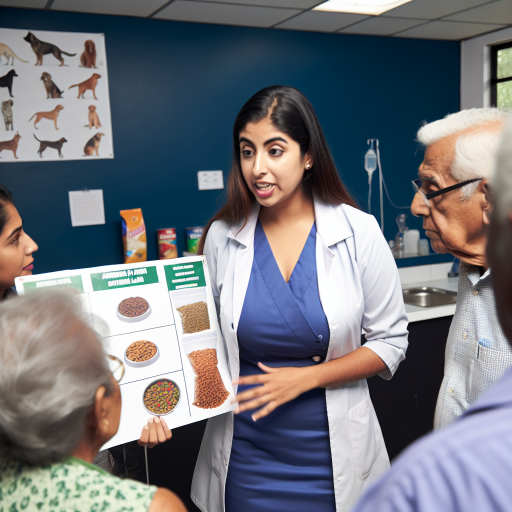Quality Control Inspectors play a crucial role in ensuring the safety and quality of grains during the inspection process.
Their responsibilities include assessing the quality of grains, ensuring compliance with regulations, and identifying any potential health hazards.
Quality control is essential for maintaining the integrity of the grain supply chain and protecting consumers from harmful contaminants.
Inspectors must carefully examine samples of grains for signs of mold, pests, or other defects that could pose risks to human health.
Inspectors are responsible for verifying that grains meet industry standards and specifications.
They must also document their findings accurately to ensure transparency and accountability in the inspection process.
The role of a Quality Control Inspector in grain inspection is vital for safeguarding the quality and safety of grains consumed by people around the world.
Their attention to detail and commitment to upholding quality standards are essential for maintaining the integrity of the grain industry.
Training and Qualifications:
To become a Quality Control Inspector in the grain industry, one must have a high school diploma or GED.
A bachelor’s degree in agriculture, biology, chemistry, or a related field is often preferred for this role.
Hands-on experience in agriculture or food production is beneficial to understand the complexities of grain inspection.
Knowledge of agricultural practices and grain quality standards is crucial to accurately assess grain quality.
Training in quality control procedures, sampling techniques, and testing methods is essential for this role.
Familiarity with relevant regulations and guidelines, such as those from the USDA, is important for compliance.
Some certifications may be required, such as the Certified Grain Grader certification offered by the USDA.
Obtaining a license to operate testing equipment, such as moisture meters or sieves, may be necessary for inspection.
Having a solid educational background and practical experience in agriculture or food production is key to becoming a successful Quality Control Inspector in the grain industry.
The ability to interpret and apply grain quality standards, as well as adhere to relevant regulations, is essential for ensuring the accuracy and reliability of inspections.
Additionally, obtaining any necessary certifications or licenses demonstrates a commitment to professional development and adherence to industry standards.
Inspection Procedures:
Quality Control Inspectors follow specific procedures when inspecting grains to maintain quality standards.
Transform Your Career Today
Unlock a personalized career strategy that drives real results. Get tailored advice and a roadmap designed just for you.
Start NowInspectors sample grains by using tools such as probes, triers, or scoops to collect representative samples.
Sampling involves taking samples from various parts of a grain lot to ensure a comprehensive analysis.
Inspectors test samples for moisture content, foreign material, weight, and other quality parameters.
They analyze samples using equipment like moisture meters, sieves, and scales for accurate results.
Following standardized inspection protocols is crucial to ensure consistency in results across different inspections.
Standardized protocols help in comparison between different grain batches and ensure accuracy in quality assessment.
Inspectors adhere to specific steps outlined in protocols to avoid errors and maintain high-quality standards.
Consistency in inspection procedures helps in identifying quality issues early and implementing corrective measures promptly.
Inspectors document all inspection procedures, results, and any deviations from standard protocols for record-keeping purposes.
- Quality Control Inspectors follow specific procedures when inspecting grains to maintain quality standards.
- Inspectors sample grains by using tools such as probes, triers, or scoops to collect representative samples.
- Sampling involves taking samples from various parts of a grain lot to ensure a comprehensive analysis.
- Inspectors test samples for moisture content, foreign material, weight, and other quality parameters.
- They analyze samples using equipment like moisture meters, sieves, and scales for accurate results.
- Following standardized inspection protocols is crucial to ensure consistency in results across different inspections.
- Standardized protocols help in comparison between different grain batches and ensure accuracy in quality assessment.
- Inspectors adhere to specific steps outlined in protocols to avoid errors and maintain high-quality standards.
- Consistency in inspection procedures helps in identifying quality issues early and implementing corrective measures promptly.
- Inspectors document all inspection procedures, results, and any deviations from standard protocols for record-keeping purposes.
Learn More: How to Inspire Students in Agricultural Science
Quality Assurance:
Quality Control Inspectors play a critical role in ensuring that grains meet quality standards.
They are responsible for carefully evaluating various aspects of the grains to guarantee they meet the required criteria.
Inspectors use a variety of testing equipment and tools to assess the quality of grains.
This equipment includes moisture meters, sieves, scales, and colorimeters.
Each tool provides valuable information about the grains’ quality.
Maintaining detailed records of inspection results is crucial for quality assurance purposes.
These records document the specific tests conducted, the results obtained, and any deviations from the standard quality parameters.
By meticulously documenting inspection findings, inspectors can track trends over time.
They identify potential issues in the production process and make informed decisions to improve overall product quality.
Uncover the Details: Biotechnology and the Future of Farming Practices
Transform Your Career Today
Unlock a personalized career strategy that drives real results. Get tailored advice and a roadmap designed just for you.
Start NowIdentifying Contaminants:
Inspectors play a crucial role in identifying contaminants in grains during the inspection process.
They follow specific procedures to ensure the quality and safety of the grains before they are distributed to consumers.
Process of Identifying Contaminants:
- Inspectors visually examine the grains for signs of mold, pests, and foreign matter.
- They may use tools such as magnifying glasses and microscopes to inspect the grains more closely.
- Inspectors also smell the grains to detect any unusual or off-putting odors that may indicate contamination.
- If necessary, samples of the grains may be sent to a laboratory for further testing and analysis.
Common Types of Contaminants:
- Mold is a common contaminant that inspectors look for, as it can pose serious health risks if consumed.
- Pests such as insects and rodents can also contaminate grains and lead to spoilage.
- Foreign matter, such as stones, dirt, or metal fragments, can cause physical harm if ingested.
Determining Severity of Contamination:
- Inspectors assess the extent of contamination by considering factors such as quantity and distribution of contaminants.
- They determine whether the contamination is localized or widespread throughout the batch of grains.
- Inspectors also evaluate the potential risk to human health and the overall quality of the grains.
Recommendation of Actions:
- Based on their assessment, inspectors recommend appropriate actions to address the contamination.
- If the contamination is minimal, they may suggest methods for separating and removing the contaminants from the grains.
- In cases of severe contamination, inspectors may recommend destroying the entire batch of grains to prevent harm to consumers.
- Inspectors also provide guidance on preventive measures to minimize the risk of future contamination in grain storage and handling.
The role of a quality control inspector in identifying contaminants in grains is essential for maintaining the safety and quality of grain products in the market.
You Might Also Like: Poultry Farming Trends and Poultry Scientists

Role of Quality Control Inspectors in Grain Inspection
Quality Control Inspectors play a crucial role in the grain inspection process.
They ensure that grains meet industry standards and government regulations.
Compliance with these regulations is essential to uphold the quality of grains in the market.
Regulatory Requirements
- Inspectors must adhere to regulatory requirements set by government agencies and industry organizations.
- Regulations may include guidelines for grain quality, safety, handling, and documentation.
- Inspectors need to stay updated on any changes or updates to regulations to ensure compliance.
Ensuring Grains Meet Industry Standards
- Inspectors perform thorough inspections of grains to ensure they meet quality standards.
- They assess factors such as moisture levels, cleanliness, foreign matter, and infestation.
- Inspectors use specialized tools and equipment to conduct quality control tests.
- They follow standardized procedures to maintain consistency and accuracy in inspections.
Upholding Government Regulations
- Inspectors play a key role in upholding government regulations related to grain inspection.
- They ensure that grains comply with safety standards to protect consumer health.
- Inspectors verify that grains are accurately labeled and documented as per regulatory requirements.
Consequences of Non-Compliance
- Non-compliance with regulations can lead to penalties, fines, or legal action against grain suppliers.
- It can damage the reputation of the supplier and compromise the quality of grains in the market.
- Inspectors help prevent non-compliance by conducting thorough inspections and ensuring adherence to regulations.
Quality Control Inspectors play a vital role in ensuring that grains meet industry standards and comply with government regulations.
Their attention to detail and adherence to regulatory requirements help maintain the quality and safety of grains in the market.
Find Out More: Dairy Scientist’s Involvement in Cheese Production
Communication with Stakeholders:
- Effective communication for Quality Control Inspectors in the grain industry is crucial for accuracy.
- Inspectors communicate inspection results and recommendations to stakeholders such as farmers, grain processors, and regulatory agencies.
- Building trust and maintaining positive relationships with stakeholders is a key role for inspectors.
Communication is a vital aspect of a Quality Control Inspector’s role in the grain industry.
It plays a significant role in ensuring that the inspection process runs smoothly and that accurate results are obtained.
Effective communication can help inspectors convey important information to stakeholders, such as farmers, grain processors, and regulatory agencies, while also building trust and maintaining positive relationships.
Importance of Effective Communication:
Effective communication is essential for Quality Control Inspectors in the grain industry as it enables them to accurately convey inspection results and recommendations to stakeholders.
This ensures that all parties involved have a clear understanding of the quality of the grain being inspected, as well as any potential issues that need to be addressed.
By communicating effectively, inspectors can help stakeholders make informed decisions about the grain, whether it is for processing, distribution, or regulatory compliance.
This can ultimately lead to improved quality control measures and increased trust in the inspection process.
How Inspectors Communicate Inspection Results:
Inspectors communicate inspection results through various channels, including written reports, verbal updates, and meetings with stakeholders.
Written reports are often detailed and provide a comprehensive overview of the inspection findings, including any defects or issues identified.
Verbal updates are given in person or over the phone and can be used to provide real-time information to stakeholders.
Transform Your Career Today
Unlock a personalized career strategy that drives real results. Get tailored advice and a roadmap designed just for you.
Start NowMeetings with stakeholders allow inspectors to discuss the results in more detail, answer any questions, and provide recommendations for further actions that may be required.
Role in Building Trust and Maintaining Relationships:
Inspectors play a critical role in building trust with stakeholders by ensuring transparency and openness throughout the inspection process.
By providing clear and concise communication, inspectors can demonstrate their expertise and professionalism, which can help establish credibility and trust.
Additionally, maintaining positive relationships with stakeholders is essential for long-term success in the grain industry.
By fostering strong relationships, inspectors can create a collaborative environment where information is freely shared and concerns are addressed promptly.
This can lead to more effective problem-solving and a greater sense of teamwork among all parties involved.
Quality Control Inspector’s Role in Grain Inspection
Quality Control Inspectors play a vital role in the grain industry by ensuring that grains meet safety and quality standards.
Inspectors are responsible for carefully examining samples of grains to detect any defects, impurities, or contaminants.
They use various tools and techniques to conduct visual inspections, moisture content measurements, and other quality tests.
Inspectors must accurately record and document their findings to maintain traceability and accountability in the inspection process.
They work closely with farmers, grain handlers, and regulatory agencies to ensure compliance with industry regulations and standards.
Importance of Quality Control Inspectors
In summary, Quality Control Inspectors are crucial in maintaining the safety and quality of grains in the industry.
Their attention to detail and adherence to strict protocols help to protect consumers and uphold the integrity of the grain supply chain.
It is important to recognize and appreciate the essential work of Quality Control Inspectors in safeguarding the food supply and promoting public health.
Additional Resources
Grain Inspection | Washington State Department of Agriculture




